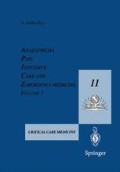Abstract
Physicians are professionals, and the highest professional ethical standard places the welfare of the professional’s patients first and foremost. Problems involved with intensive care and organ failure exemplify both the high cost of health care and poor or limited prognosis of terribly sick patients in combination with concerns about privacy, dignity, the primacy of the individual, and the right to die peacefully with one’s loved ones close at hand. No respectable physician prolongs life by mechanical or artificial means when it is unnecessary, unqualitative, or futile. But how does one determine necessity or quality or futility? Ethical discussions abound; living wills attempt to control one’s fate, and legal battles continue.
Access this chapter
Tax calculation will be finalised at checkout
Purchases are for personal use only
Preview
Unable to display preview. Download preview PDF.
References
Baue AE (1990) The sociology of multiple organ failure. In: Baue AE, Multiple organ failure: Patient care and prevention. Mosby Year Book, St. Louis, pp 515–518
Baue AE (1990) The patient as a person: Ethical considerations of patients with multiple organ failure. In: Baue AE, Multiple organ failure: Patient care and prevention. Mosby Year Book, St. Louis, pp 512–514
Taber R (1976) Preventing ulcer bleeding in multiple systems failure. Arch Surg 111:93
Vaus K (1974) Biomedical ethics: Morality for the new medicine. Harper & Row, New York
Harron F, Burnside J, Beauchamp T (1983) Health and human values: A guide to making your own decisions. Yale University Press, New Haven
Levine H (1986) Life choices: Confronting the life and death decisions created by modern medicine. Simon & Schuster, New York
Bulger RJ (1987) On the drinking of hemlock: Socrates, Semmelweis, and Barbara McClintock; Erikson EH: The Golden Rule and the cycle of life; Pellegrino ED: Toward an expanded medical ethics: the Hippocratic ethic revisted. In: Bulger RJ (ed) In search of the modern Hippocrates. University of Iowa Press, Iowa City
Behringer E, Steinberger HA, Price J et al (1996) Correlations between do not resuscitate (DNR) orders and advanced directives in SICU patients who expire. Crit Care Med 24:A2
Fakhry SM, Gaafar BS, Welna SM et al (1996) “Do-not-resuscitate” orders in critical care: An immediate prelude to withdrawal of support. Crit Care Med 24:A2
Cantor NL (1996) Can healthcare providers obtain judicial intervention against surrogates who demand “medically inappropriate” life support for incompetent patients? Crit Care Med 24(5):883–887
Sprung CL, Eidelman LA (1996) Judicial intervention in medical decision-making: A failure of the medical system? Crit Care Med 24(5):730–732
Compiled from News Services (1995) Patients’ care seldom matches their wishes: Efforts to prolong life cause suffering for dying, study finds, St. Louis Post-Dispatch, Wednesday, November 22
Connors Jr AF, Dawson NV (1995) A controlled trial to improve care for seriously ill hospitalized patients: The study to understand prognoses and preferences for outcomes and risks of treatment (Support). JAMA 274(20): 1591–1598
Lo B (1995) Improving care near the end of life: Why is it so hard? JAMA 274(20): 1634–1636
Kassirer JP (1994) Incorporating patients’ preferences into medical decisions. N Eng J Med 330(26): 1895–1896
Konopad E, Noseworthy TW, Johnston R et al (1995) Quality of life measures before and one year after admission to an intensive care unit. Crit Care Med 23(10): 1653–1659
Eiseman B (1995) Independence, pain relief rated top therapeutic goals: Elderly emphasize quality of life over duration. General Surgery & Laparoscopy News, pp 1–3
Testa MA, Simonson DC (1996) Assessment of quality-of-life outcomes. Current Concepts 334(13):835–840
Alpers A, Lo B (1995) When is CPR futile? JAMA 273(2):156–158
Curtis R, Park DR, Krone MR et al (1995) Use of the medical futility rationale in do-not-attempt-resuscitation orders. JAMA 273(2): 124–128
Luce JM (1995) Physicians do not have a responsibility to provide futile or unreasonable care if a patient or family insists. Crit Care Med 23(4):760–766
Civetta JM (1996) A practical approach to futile care. Bulletin of the American College of Surgeons 81(2):24–29
Editor information
Editors and Affiliations
Rights and permissions
Copyright information
© 1997 Springer-Verlag Italia
About this paper
Cite this paper
Baue, A.E., Baue, R.D. (1997). Medical Decision Making in Critical Care The Patient as a Person. In: Gullo, A. (eds) Anaesthesia, Pain, Intensive Care and Emergency Medicine — A.P.I.C.E.. Springer, Milano. https://doi.org/10.1007/978-88-470-2296-6_92
Download citation
DOI: https://doi.org/10.1007/978-88-470-2296-6_92
Publisher Name: Springer, Milano
Print ISBN: 978-3-540-75032-1
Online ISBN: 978-88-470-2296-6
eBook Packages: Springer Book Archive

